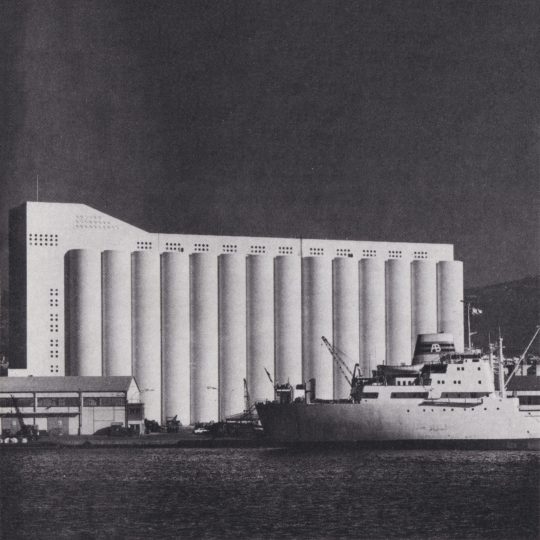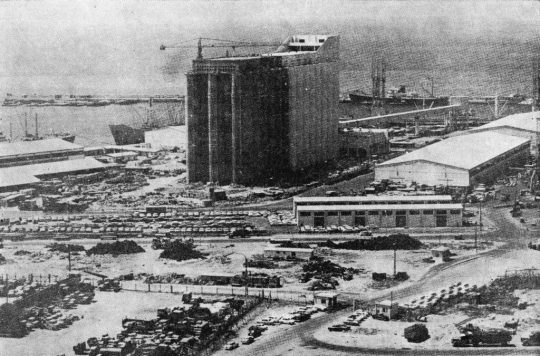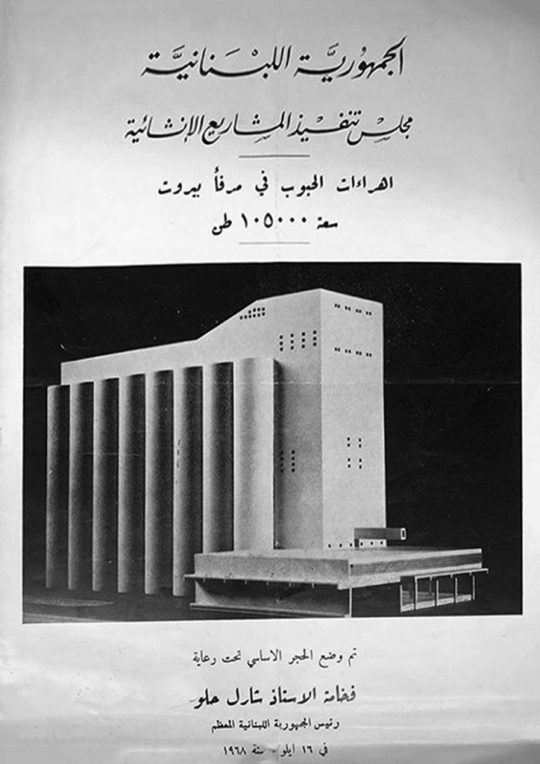#beirut grain silos
Explore tagged Tumblr posts
Photo

(vía Hidden Architecture » Beirut Grain Silos - Hidden Architecture)
142 notes
·
View notes
Text
Still no answers three years after Beirut mega-explosion
Three years on, the probe into the traumatic disaster caused by a huge pile of poorly-stored fertiliser remains bogged down in legal and political wrangling, to the dismay of victims' families.

BEIRUT: One of history's biggest non-nuclear explosions rocked Beirut on August 4, 2020, destroying swathes of the Lebanese capital, killing more than 220 people and injuring at least 6,500.
Three years on, the probe into the traumatic disaster caused by a huge pile of poorly-stored fertiliser remains bogged down in legal and political wrangling, to the dismay of victims' families.
The mega-blast
The massive explosion, heard as far away as Cyprus, destroys much of Beirut port and entire districts of the city in scenes that shock the country and the world.
The blast leaves a 43-metre (141 foot) deep crater and registers as the equivalent of a magnitude 3.3 earthquake.
The disaster spreads fear and chaos, with mountains of broken glass littering roads and bloodied survivors flooding overwhelmed hospitals.
The blast was caused by a fire in a warehouse where a vast stockpile of the industrial chemical ammonium nitrate had been haphazardly stored for years.
The tragedy strikes amid a deep economic crisis, almost a year after mass demonstrations erupted against a ruling class deemed inept and corrupt as living conditions worsen.
On August 10, Prime Minister Hassan Diab resigns under a barrage of pressure over the explosion.
Probe thwarted
In December 2020, the lead investigator examining the blast, Fadi Sawan, charges Diab and three ex-ministers with negligence.
Two of them file a complaint, the probe is suspended, and Sawan is removed from his post by court order.
In July 2021, the new investigating magistrate, Tarek Bitar, moves to interrogate four former ministers but parliament stalls on lifting their immunity.
He is forced to suspend the probe following a series of court challenges.
Gun battle
In October 2021, the powerful Shiite movement Hezbollah and its ally Amal call for demonstrations to demand Bitar's dismissal.
Seven people are killed in gun battles during the rally.
At the end of 2021, Bitar resumes his investigation but less than two weeks later is forced to suspend work for a fourth time following more legal challenges.
Silos collapse
On August 4, 2022, several grain silos damaged in the explosion collapse in a cloud of dust, a traumatic reminder of the disaster that struck exactly two years before.
Days earlier, other parts of the silos crumbled after a fire broke out when remaining grain stocks fermented and ignited in the summer heat.
Judicial showdown
In January 2023, 13 months after his probe is suspended, Bitar resumes work and charges Prosecutor General Ghassan Oueidat and seven others with probable intent to murder, arson and other crimes.
Oueidat in turn charges Bitar with insubordination and "usurping power" but the investigator refuses to step down.
Oueidat also orders the release "of all those detained" over the port blast, leaving the investigation stalled and nobody yet held to account.
Victims' families and rights groups urge the United Nations to create an independent fact-finding mission.
0 notes
Text
An explosion occurred after grain silos partially collapsed at the Beirut port Lebanon
August 1 2022
37 notes
·
View notes
Photo






A short history of the Beirut Grain Silos, site of the catastrophic August 4, 2020 explosion. On July 30, 2022, the neglected silos finally collapsed.
18 notes
·
View notes
Text
Satellite images show Russian dry cargo ships loaded with stolen Ukrainian grain





New images from Maxar Technologies on May 19 and 21 show the ships - "Sailor Pozynich" and "Sailor Cat" - moored next to something like grain silos, where the grain is dumped from the conveyor into the open hold.
Both ships have now left the port, according to the marine tracking site MarineTraffic, with Sailor Sailor sailing across the Aegean Sea claiming to be in Beirut and Sailor Cat still in the Black Sea.
#russian agression#ukraine war#war#ukraine#stop russia#stop putin#war crimes#stop war#economical war
7 notes
·
View notes
Photo

From The Aftermath of the Beirut Explosion, one of 23 photos. An aerial view shows the massive damage at Beirut port's grain silos (center) and the area around it on August 5, 2020, one day after a massive explosion hit the harbor in the heart of the Lebanese capital. (AFP / Getty)
73 notes
·
View notes
Text
Friday, March 26, 2021
Border crossings strain resources in Rio Grande Valley (AP) Elmer Maldonado spent a week in immigration custody with his 1-year-old son after crossing the Rio Grande through Texas to request asylum. One night, the Honduran father and son slept on the dirt under a bridge shivering from the cold temperatures at an intake site where large groups of migrants turn themselves in to Border Patrol officers. His experience illustrates a cycle that is repeating itself thousands of times a week amid a dramatic rise in migrant children and families at the U.S.-Mexico border: They arrive in the middle of the night by the dozens and are kept at outdoor intake sites, then taken to overcrowded detention facilities well past the 72-hour court-imposed limit. From there, the families are either released into the U.S. or expelled to Mexico, the lucky ones dropped off at a COVID-19 testing site with documents. Children traveling without their parents go to federal shelters that are also quickly filling up. The process is largely out of the public eye. The Associated Press has not been allowed in any of the Border Patrol facilities. Journalists are often limited by authorities even when going to the banks of the Rio Grande to witness the process and talk to immigrants.
Capitol fencing removed 77 days after deadly riot (USA Today) An imposing fence-line strung with razor wire has been removed from the outer perimeter of the U.S. Capitol complex, more than two months after the deadly siege. Capitol Police said Wednesday that local streets blocked by the network of barriers also had been re-opened to traffic, though authorities said they are prepared to “quickly ramp up security at a moment’s notice, if needed.” An inner-perimeter fence around the actual Capitol building will remain in place while police and lawmakers continue to hash out a long-term security plan.
US saw estimated 4,000 extra murders in 2020 amid surge in daily gun violence (Guardian) For exactly a year during the pandemic, the United States did not see a single high-profile public mass shooting. But a surge in daily gun violence contributed to an estimated 4,000 additional murders throughout 2020, in what experts warn will probably be the worst single-year increase in murders on record. Early estimates suggest the US may have seen at least 4,000 more murders last year than in 2019, and potentially as many as 5,000 more, according to projections based on FBI data, though complete official statistics will not be available until the fall. Many of the homicides are concentrated in communities of color that have historically seen the worst burden of daily gun violence, including in Philadelphia, St Louis, Chicago and Oakland.
In Myanmar, a New Resistance Rises (NYT) In a jungle in the borderlands of Myanmar, the troops sweated through basic training. They learned how to load a rifle, pull the pin of a hand grenade and assemble a firebomb. These cadets are not members of Myanmar’s military, which seized power last month and quickly imposed a battlefield brutality on the country’s populace. Instead, they are an eclectic corps of students, activists and ordinary office workers who believe that fighting back is the only way to defeat one of the world’s most ruthless armed forces. After weeks of peaceful protests, the frontline of Myanmar’s resistance to the Feb. 1 coup is mobilizing into a kind of guerrilla force. In the cities, protesters have built barricades to protect neighborhoods from military incursions and learned how to make smoke bombs on the internet. In the forests, they are training in basic warfare techniques and plotting to sabotage military-linked facilities. The opposition is a defensive response to the military’s mounting reign of terror. The Tatmadaw has cracked down on peaceful protesters and unarmed bystanders alike, killing at least 275 people since the coup, according to a monitoring group.
Torch relay for Tokyo Olympics kicks off its 121-day journey (AP) The torch relay for the postponed Tokyo Olympics began its 121-day journey across Japan on Thursday and is headed toward the opening ceremony in Tokyo on July 23. The relay began in northeastern Fukushima prefecture, the area that was devastated by the 2011 earthquake, tsunami and the meltdown of three nuclear reactors. About 18,000 died in the tragedy. About 10,000 runners are expected to take part, with the relay touching Japan’s 47 prefectures.
Taiwan beefing up its defenses (South China Morning Post) Taiwan has begun mass production of a long-range missile and is developing three other models, a senior official said on Thursday, in a rare admission of efforts to develop strike capacity amid growing pressure from mainland China. The island’s armed forces are in the middle of a modernization program to offer a more effective deterrent, including the ability to hit back at bases deep within mainland China in the event of a conflict.
Some Australians return home as others evacuated in floods crisis (Reuters) Australians hit by devastating floodwaters began returning to their homes on Thursday as skies cleared and authorities accelerated clean-up efforts, though fresh evacuation orders were issued in some areas where water levels were still rising. Relentless rains for five straight days—the worst downpour in more than half a century—burst river banks, inundating homes, roads, bridges and farms and cutting off entire towns in Australia’s east. More than 40,000 people were forced to move to safe zones and two men were killed after their cars became trapped in floodwaters. Water continued to flow from overloaded dams and rivers on Thursday, particularly in New South Wales state, leading authorities to urge caution. Major flooding also continues in Sydney’s western suburbs of North Richmond and Windsor, while fresh evacuation orders were issued for some areas in the centre of the state.
One man’s mission offers Beirut neighbourhood a vision of hope after blast (Reuters) The sheer scale of the destruction in Beirut’s Karantina district after the massive explosion at the port last August made rebuilding a daunting feat. That was where Marc Torbey El Helou, a charity worker, came in. The low-income neighbourhood was one of the closest to the blast that killed 200 people. It stands across from the giant, mutilated grain silo that has become a symbol of the tragedy. Helou decided a day after the explosion to dedicate himself, and the aid group he runs, to rebuilding the neighbourhood. Just removing the rubble required 300 truckloads. Some buildings needed immediate help to stop them collapsing. Helou says the same of Karantina’s residents. “There were children here who would not laugh or play for months.” Helou’s charity, Offre Joie (Joy of Giving), has repaired Lebanese districts hit by war and violence since 1985. “Unfortunately, it means we have the experience for this,” said Helou, 33, who has used a wheelchair since a diving accident in 2016. With the Lebanese state hollowed out by decades of corruption and failure, it fell to aid groups and volunteers like Helou to rebuild the city. Offre Joie took on six blocks in Karantina and nearby. That includes the homes of about 350 families. More than seven months after the explosion, one of the largest non-nuclear detonations on record, many residents have yet to return. But the streets are bustling with life again, and the buildings never looked so good. The charity’s budget was trapped in the bank thanks to controls imposed during Lebanon’s financial crisis. But donations poured in from abroad: up to three million dollars in cash, construction material and containers full of food. Thousands of volunteers also came, including engineers and psychologists.
Musical Chairs But The Song Never Ends (NYT) Four elections in two years have failed to give Israeli Prime Minister Benjamin Netanyahu the necessary 61 seats to form a coalition government with a majority in Parliament. With more than 90% of Wednesday’s vote counted, Netanyahu’s right-wing alliance had 52 seats and his opponents had 56. And the gridlock extends beyond the election. Administrative stagnation has left Israel without a national budget for two consecutive years in the middle of a pandemic, and with several key Civil Service posts unstaffed. The idea that the political deadlock paralyzing the country isn’t going to get better, and in fact appears to have gotten worse, has Israelis pondering the viability of their electoral system, the functionality of their government and whether the divisions between the country’s various politics—secular and devout, right-wing and leftist, Jewish and Arab—have made the nation unmanageable. A Tel Aviv-based analyst said Israel isn’t yet a failed state, like Lebanon, because it still has institutions. “But there is definitely erosion,” she said. “Not having a budget for two years—this is really dangerous.”
Saudi official denies threat to harm UN Khashoggi investigator (Reuters) A senior Saudi official denied on Thursday he had threatened to harm the human rights expert who led the U.N. investigation into the murder of journalist Jamal Khashoggi, after the United Nations confirmed the expert’s account of the threat. Agnes Callamard, the U.N. expert on summary killings, has said that a Saudi official threatened at a Jan. 2020 meeting in Geneva that she would be “taken care of” if she was not reined in following her investigation into the journalist’s murder. She said the remark was interpreted by U.N. officials as a “death threat”. The United Nations confirmed her account on Wednesday, describing the remark as a “threat”. Neither Callamard nor the United Nations has identified the Saudi official who made the remark. However, the head of Saudi Arabia’s human rights commission, Awwad Alawwad, identified himself as the official on Thursday, while denying he had intended any threat.
Stuck ship in Egypt’s Suez Canal imperils shipping worldwide (Washington Post) A skyscraper-sized cargo ship wedged across Egypt’s Suez Canal further imperiled global shipping Thursday as at least 150 other vessels needing to pass through the crucial waterway idled waiting for the obstruction to clear, authorities said. The Ever Given, a Panama-flagged ship that carries cargo between Asia and Europe, ran aground Tuesday in the narrow, man-made canal dividing continental Africa from the Sinai Peninsula. In the time since, efforts to free the ship using dredgers, digging and the aid of high tides have yet to push the container vessel aside—affecting billions of dollars’ worth of cargo. Overall, famed shipping journal Lloyd’s List estimates each day the Suez Canal is closed disrupts over $9 billion worth of goods that should be passing through the waterway. A quarter of all Suez Canal traffic a day comes from container ships like the Ever Given, the journal said. “Blocking something like the Suez Canal really sets in motion a number of dominos toppling each other over,” said Lars Jensen, chief executive of Denmark-based SeaIntelligence Consulting. “The effect is not only going to be the simple, immediate one with cargo being delayed over the next few weeks, but will actually have repercussions several months down the line for the supply chain.”
2 notes
·
View notes
Text

08/07/20
Lebanese plan major protest and UN agencies call for aid after Beirut blast
Angry Lebanese are planning a major protest in central Beirut on Saturday where they will pay respects to those killed in this week’s blast and renew calls to overthrow the country’s political system.
Unicef said the homes of about 100,000 children had been damaged, some so badly that they had become uninhabitable, along with 120 of the city’s schools. With the country’s only grain silo destroyed, the World Food Programme warned that “an already grim food security situation” would be exacerbated. The death toll is more than 150, and the Lebanese Red Cross says dozens more could still be buried or trapped under debris.
9 notes
·
View notes
Text
Beirut explosion - What happened?
youtube
This huge explosion shook Beirut, the capital of Lebanon to the core. All of the city was heavily damaged. Shock-waves were felt in all of Lebanon and even in the neighboring country Cyprus (207 km or 128 miles away).
According to Aljazeera news: "Seismologists measured the event, which blew out windows at the city's international airport nine kilometres (more than five miles) away, as the equivalent of a magnitude-3.3 earthquake."
Port Beirut, which is now completely destroyed, is the country's main shipping point in this country that relies majorly on importing food and medicine since the local production is never sufficient. The grain silos that were stored there and contained 3 months worth of wheat were utterly destroyed. The country is facing a very grim future regarding food security.
Amid the most severe economic crisis Lebanon has ever faced, more than 300,000 people have lost their homes, more than 5,000 injured and 137 killed. That is without counting the numerous people that are still missing until today either because they were lost to the sea, trapped under the debris or whose bodies are not yet found...
The Lebanese people are suffering so much, they were already suffering due to the COVID-19 outbreak that exacerbated the country's economic crisis (leading to many people losing their jobs, a 30% unemployment rate, the Lebanese pound losing 60% of its value...) people were barely able to afford their basic necessities, and now this!!! The people cannot take it anymore!!
This corrupt government, which is the reason of the economic crisis, does not even have the decency to take responsibility for what happened! They are not helping the already broken people get back on their feet!! Instead we are relying on help from other countries because those corrupt pieces of s*** do not even have the decency to use the money they stole from people to help them!! Even foreign governments now know that they should not send help to the government or it will evaporate, instead they should send it directly to the people through NGOs. Right now, it's the people who are helping the people and not the government helping the people. We are surviving due to the solidarity between the Lebanese in times of crises and due to the help of other countries.
I am from Lebanon, I live about 3 km away from the epicenter of the explosion. My whole house shook, i thought it was an earthquake, i thought the whole building was gonna crumble on top of our heads (me and my family), i thought then and there that we were all gonna die. But thank God no one was hurt, and that was only due to God protecting us, some of our windows broke, large and sharp glass shards flew inside my brother's room who was having a nap on his bed near the window. My father and sister who were in the kitchen (where the window also broke), found themselves in another room still trying to understand what happened. Brown dust flew into the house from all directions and even entered from the closed windows. The panic, the mix of emotions, the despair, the fear, that immediate moment afterwards when we were trying to understand what happened... Did a building nearby collapse? Was there a gas explosion in the building? Was it a car that exploded in the street? Was someone assassinated?
We never would have imagined that this explosion was so far from our home. That day, on August 4th, a weapon of mass destruction was detonated in the heart of the capital. There are many theories as to what caused it (accident, negligence, attack from Israel...) , there is no way to know the truth since our corrupt government will probably hide it. But one thing is for sure, first we will pick ourselves up, then we will mourn but after that we will have our revenge, the revolution of 17 October will be back, and stronger than ever before.
Everyone please pray for Lebanon, pray for its people, and pray for those people that have already suffered so much.

7 notes
·
View notes
Text

Biruit as of today.
More than 2,750 tonnes of ammonium nitrate exploded in the warehouse from a fire sparked by a welding torch. Plus the grain silo may have added to it.
However ammonium nitrate has an RE factor 0.42. So the Net Explosive Weight (NEW) of 1,276 pounds of TNT.
That's 2000 times larger than the largest single bomb we have in the US arsenal outside the MOAB.
The MOAB is only 18,700lbs of H6, so a NEW of 25,245 lbs of TNT.
The explosion in Beirut was 100 times larger than the MOAB the USA's largest conventional bomb.
6 notes
·
View notes
Text
2020
Week 32: August 3-9
3: Microsoft is in talks to buy Tiktok from its Chinese owning company ByteDance. And in California, wildfire season has begun with a large-scale blaze. The Apple fire has singed up 20,500 acres near Los Angeles - by the end of the summer, much of the coast will be engulfed with smoke as fires rage throughout the Pacific Northwest in the driest, smokiest season in recent memory.

Hussein Malla/AP
4: A large shipment of long-neglected ammonium nitrate warehoused in the port city of Beirut goes up in flames, igniting a large-scale explosion that levels city blocks and kills at least 204 people. Buildings up to 10km away sustain damage - and shockwaves are felt as far away as Cyprus. Photos of the city capture blocks upon blocks of blown-out apartments, strewn glass and roads clogged with rubble. Lebanon, already facing down a flagging economy, defaulted loans and a looming health crisis, now faces the struggle to house the 300,000 newly-homeless residents displaced by the eruption. Three hospitals were completely destroyed - killing at least 4 nurses and 15 COVID patients. Two others were damaged - and all are strained to capacity with the incoming wounded. Grain silos in the city’s port are destroyed, sending the country into food shortages in coming weeks.
5: Isaias - the 2020 Atlantic storm season’s second hurricane - finally peters out over Quebec. It raked along the eastern seaboard causing flooding, high winds and even low-grade tornados over Delaware, Maryland and Virginia. Millions of homes are left without power across New York, New Jersey and Connecticut. Falling trees, flooding, rip-currents and lightning-strikes claim 18 victims during the storm. In India, Prime Minister Modi lays the ceremonial first stone at a new temple in Ayodhya. The Babri Mosque previously occupied the site. Built in the 16th century, the mosque was destroyed during religious violence and riots during the 1990s. Archaeological reports indicated that, beneath the mosque, there was an earlier Hindu shrine, marking the birthplace of the god Rama. The country’s Supreme Court ruled that the land be returned to Hindu hands while a replacement mosque was built elsewhere. The country has seen dramatic swing towards Hindu nationalism under Modi’s leadership, accompanied by a distinct uptick in violence towards Muslims, a religious minority.

Hyderabad’s Muslim MP Asaduddin Owaisi says that Modi’s participation in the ceremony is a violation of the country’s secular structure and constitution. Muslim journalist Rana Ayyub calls the temple’s inauguration, at the site of a crime against Muslims, is an “ugly dance of fascism” - Rajesh Kumar Singh/AP
6: Allan Lichtman, a historian who has successfully forecast every election cycle since 1980 including the upset 2016 contest, claims that his unique model bodes well for Biden. It’s welcome news because the Democratic hopeful has just cancelled his upcoming Milwaukee trip due to rising numbers. Campaigning during coronavirus - when door knocking, canvassing, and rallies are seen as dangerous and virus-spreading - presents its own rich mosaic of challenges.
7: Bubonic plague is back. I’m not kidding. China shuts off the Inner Mongolia village of Suji Xincun after a herdsman becomes ill and dies of the illness. In Thailand protests continue as people demand new elections, reforms to the monarchy, and a new constitution to replace the one drafted by the military after the 2014 coup.
8: Frustrated protesters clash with security forces in Beirut as they rally against the government mismanagement and corruption. The ammonium nitrate that sparked Tuesday’s explosion had been stored in an insecure warehouse in the city’s port for six years, despite custom officials frequent appeals to government officials and the Lebanese courts to allow them to dispose of the material, transferring it to the army or selling it to local demolitions companies. For many Lebanese people, the blast is the latest embodiment of government negligence and incompetence.

Sergei Grits/AP
9: It’s election day in Belarus, following weeks of brutal government crackdowns on independent journalists, activists, protesters, and opposition leaders. The long-time incumbent, Alexander Lukashenko, is being challenged by Sviatlana Tsikhanouskaya, an English teacher and translator unwillingly thrust into the political limelight after the arrest of her husband, Siarhei Tsikhanouski. Siarghei, a politician and entrepreneur, was detained two days after announcing his own intention to run for president on trumped up charges of assaulting a police officer. Late in the night, state-controlled media report that Lukashenko is leading exit polls with nearly 80% of the vote - which Tsikhanouskaya denounces as a rigged and unfair election. Spontaneous protests erupt across the nation - in at least 20 cities. In Minsk, the national capital, police batter protesters with pepper spray and rubber bullets. A police van barrels into a crowd, injuring a protester and another demonstrator is shot dead by security forces. Thousands are arrested - and the city is thrown into an internet blackout.
1 note
·
View note
Photo

Beirut grain silos after the explosion of August 04. Source: Photo courtesy of Emmanuel Durand, 2020.
(vía Hidden Architecture » Beirut Grain Silos - Hidden Architecture)
31 notes
·
View notes
Link
About 85% of grain silos in Lebanon's capital city of Beirut have reportedly been destroyed after a massive explosion Tuesday...
The blast at the city's port -- which manages 60% of all imports for the country -- left Beirut's largest grain elevator severely damaged, along with a grain terminal.
...Most of the 1.2 million metric tons of wheat that Lebanon imports every year comes from Russia and Ukraine, and the product usually passes through the now inoperable port, says NBC News.
See: Ice Age Farmer
The global food supply is being destroyed, production dismantled, and farmers put out of business: California is sending in "COVID-19 Strike Teams" to shut down farms that are not "properly distanced."
5 notes
·
View notes
Quote
The World Food Program (WFP) announced that it will will send 50,000 tonnes of wheat flour to Lebanon to alleviate the situation of those most affected by the explosion at Beirut’s port. In addition to the fact that the Lebanese government does not have stored grain, the country only had one silo, which was destroyed by the accident. Current flour reserves are estimated to cover the market needs for only about six weeks. The WFP considers that at least US$235 million is needed to provide food support to the most vulnerable groups. The United Nations High Commissioner for Refugees (UNHCR) reported that there are over 884,000 registered Syrian refugees living in Lebanon. Most of them are fleeing the ongoing war affecting their country.
'The World Food Program to Expand Its Aid to Lebanon', teleSUR
#teleSUR#World Food Program#WFP#wheat flour#food aid#Lebanon#Beirut port explosion#Lebanese government#grain store#flour reserves#market needs#food support#vulnerable groups#United Nations High Commissioner for Refugees#UNHCR#Syrian refugees#Syrian Civil War
4 notes
·
View notes
Text
Beirut in Apocalyptic Ruin - The Aftermath of Tuesday's Explosions
Beirut in Apocalyptic Ruin – The Aftermath of Tuesday’s Explosions
Yesterday’s two massive explosions left Beirut in what is being described as “apocalyptic ruin.” The entire Port is “gone” and all of the grain silos completely flattened – 85% of Lebanon’s grain was in those silos. Upwards of 300,000 people are now homeless due to the explosions that devastated their buildings. Hundreds of Beirut citizens are still missing. Damages are estimated at between $3…
View On WordPress
2 notes
·
View notes
Text
At Beirut port, more grain silos collapse after a severe blast in 2020
At Beirut port, more grain silos collapse after a severe blast in 2020
In the third such collapse in a month, eight additional grain silos at Beirut port collapsed on Tuesday due to damage from a deadly 2020 explosion, according to AFP correspondents. After the last of the northern block of silos, which was more severely damaged in the blast and where a fire had been raging since July, collapsed, a cloud of dust rose above the harbor. According to the French civil…

View On WordPress
0 notes